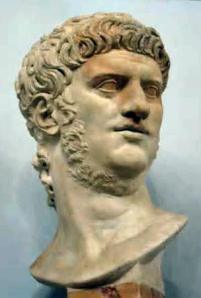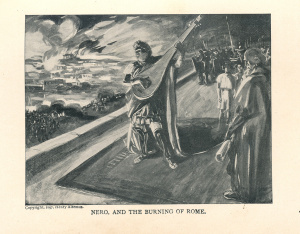Fiddled while Rome burned
 I mentioned the Roman emperor Nero in yesterday’s post. Who doesn’t know the expression Nero fiddled while Rome burned? The statement itself is said to paraphrase Nero’s ineffectual rule from 54 to 68AD.
I mentioned the Roman emperor Nero in yesterday’s post. Who doesn’t know the expression Nero fiddled while Rome burned? The statement itself is said to paraphrase Nero’s ineffectual rule from 54 to 68AD.
We know about Nero’s life and personality by the writings of two historians of the time: Tacitus and Suetonius. Their works are considered primary sources history-wise. We know Suetonius by The Twelve Caesars, a work of no little size that covers the life of Julius Caesar and eleven other Caesars before and after. And we know Tacitus by what remains of two surviving works — the Annals and the Histories. According to Tacitus, a senator as well as historian, Emperor Nero was a despot and an exceptionally cruel man. According to Suetonius, he was worse. However he was, Nero would be forever tied to a tragic event nearly two thousand years ago — On this day 1950 years ago Rome burned.
I’ll paint you a picture…
That hot July day in 64 AD was the sort  where dry gusts of wind blew the dust to stick on sweaty skin. The fire was said to have started in the market that sprawled alongside the circus, that open arena where sports of all kinds played out. The wind intensified and the fire spread and burned out of control for six days.
where dry gusts of wind blew the dust to stick on sweaty skin. The fire was said to have started in the market that sprawled alongside the circus, that open arena where sports of all kinds played out. The wind intensified and the fire spread and burned out of control for six days.
Of Rome’s 14 districts, only four escaped damage, but a more spectacular Rome was built upon the ashes of the ruined city. Before the fire, malaria-ridden marshes surrounded the city proper. The fire debris was used as fill. Marble and stone replaced charred wood wide streets for fire breaks and pedestrian arcades replaced the cramped merchant stalls and corridors. Above all there was now an ample supply of water through the Roman aqueducts: Aqua Appia, Aqua Virgo, Aqua Alexandrina, Aqua Anio Novus, and Aqua Alsietina. Rome was determined not to burn to the ground again.
Tacitus was there during the fire and later wrote this:
“…Now started the most terrible and destructive fire which Rome had ever experienced. It began in the Circus, where it adjoins the Palatine and Caelian hills. Breaking out in shops selling inflammable goods, and fanned by the wind, the conflagration instantly grew and swept the whole length of the Circus. There were no walled mansions or temples, or any other obstructions, which could arrest it. First, the fire swept violently over the level spaces. Then it climbed the hills – but returned to ravage the lower ground again. It outstripped every counter-measure. The ancient city’s narrow winding streets and irregular blocks encouraged its progress.
Terrified, shrieking women, helpless old and young, people intent on their own safety, people unselfishly supporting invalids or waiting for them, fugitives and lingerers alike – all heightened the confusion. When people looked back, menacing flames sprang up before them or outflanked them. When they escaped to a neighboring quarter, the fire followed – even districts believed remote proved to be involved. Finally, with no idea where or what to flee, they crowded on to the country roads, or lay in the fields. Some who had lost everything – even their food for the day – could have escaped, but preferred to die. So did others, who had failed to rescue their loved ones. Nobody dared fight the flames. Attempts to do so were prevented by menacing gangs. Torches, too, were openly thrown in, by men crying that they acted under orders. Perhaps they had received orders. Or they may just have wanted to plunder unhampered.
Nero was at Antium. He returned to the city only when the fire was approaching the mansion he had built to link the Gardens of Maecenas to the Palatine. The flames could not be prevented from overwhelming the whole of the Palatine, including his palace. Nevertheless, for the relief of the homeless, fugitive masses he threw open the Field of Mars, including Agrippa’s public buildings, and even his own Gardens. Nero also constructed emergency accommodation for the destitute multitude. Food was brought from Ostia and neighboring towns, and the price of corn was cut to less than ¼ sesterce a pound. Yet these measures, for all their popular character, earned no gratitude. For a rumor had spread that, while the city was burning, Nero had gone on his private stage and, comparing modern calamities with ancient, had sung of the destruction of Troy.
By the sixth day enormous demolitions had confronted the raging flames with bare ground and open sky, and the fire was finally stamped out at the foot of the Esquiline Hill. But before panic had subsided, or hope revived, flames broke out again in the more open regions of the city. Here there were fewer casualties; but the destruction of temples and pleasure arcades was even worse. This new conflagration caused additional ill-feeling because it started on Tigellinus’ estate in the Aemilian district. For people believed that Nero was ambitious to found a new city to be called after himself.
Of Rome’s fourteen districts only four remained intact. Three were leveled to the ground. The other seven were reduced to a few scorched and mangled ruins.”
“The Burning of Rome, 64 AD,” EyeWitness to History, w ww.eyewitnesstohistory. com (1999).
 Suetonius mentions how the fire devastated the Roman economy and blamed sadistic Nero as the arsonist who personally set fire to the market so that he might find a scapegoat and hold public punishments. He also said Nero played the lyre and sang the Sack of Ilium while the fires blazed out of control. I believe this is where that Nero fiddled while Rome burned comes from. A severe take on Nero as told by Suetonius
Suetonius mentions how the fire devastated the Roman economy and blamed sadistic Nero as the arsonist who personally set fire to the market so that he might find a scapegoat and hold public punishments. He also said Nero played the lyre and sang the Sack of Ilium while the fires blazed out of control. I believe this is where that Nero fiddled while Rome burned comes from. A severe take on Nero as told by Suetonius
Tacitus has a different opinion. He writes that Nero was not actually in  Rome at the time. But after the fire, Nero did find his scapegoat. He blamed the Christians and held great spectacles to kill them off. Before the fire, the Christians were just another Jewish sect with little attention paid to them. Tacitus’ Annals: A portion of his take on Nero.
Rome at the time. But after the fire, Nero did find his scapegoat. He blamed the Christians and held great spectacles to kill them off. Before the fire, the Christians were just another Jewish sect with little attention paid to them. Tacitus’ Annals: A portion of his take on Nero.
This is interesting~
More~
Did Nero really fiddle? The fiddle had yet to be invented!
۞>>>>۞<<<<۞>>>>۞<<<<۞
 For 100 days, I’ll post something from my chosen topic: Clichés. There are 67 entries to come.
For 100 days, I’ll post something from my chosen topic: Clichés. There are 67 entries to come.
Here’s a cliché for today:
Fit as a fiddle
۞>>>>۞<<<<۞>>>>۞<<<<۞
 ♥ Today’s guest~ Author Alisa Anderson
♥ Today’s guest~ Author Alisa Anderson
http://romancebooks4us.blogspot.com/
♥ The July contest is on and all the prizes go to ONE WINNER! http://www.romancebooks4us.com
۞>>>>۞<<<<۞>>>>۞<<<<۞
 Love Waits in Unexpected Places - Scorching Samplings of Unusual Love Stories
Love Waits in Unexpected Places - Scorching Samplings of Unusual Love Stories
Find my novels wherever books are sold.
Sample my love stories for free!
۞>>>>۞<<<<۞>>>>۞<<<<۞






